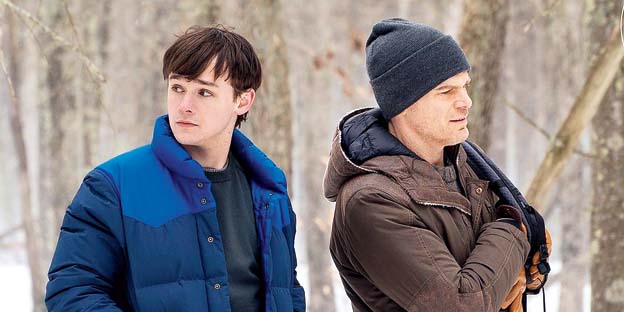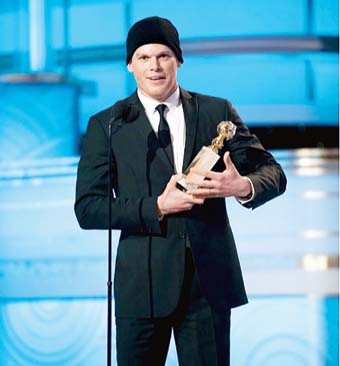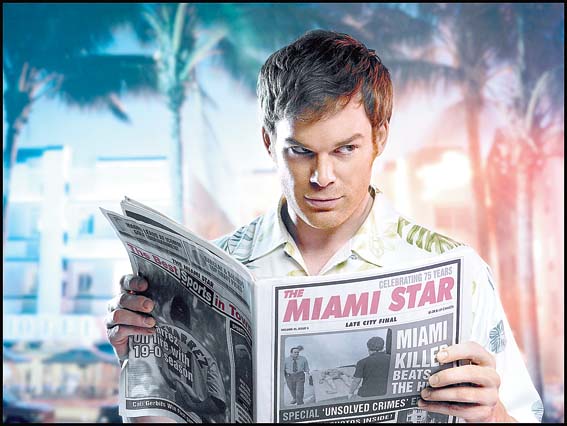In the autumn of 2006, the world came face to face with Dexter Morgan. Michael C. Hall shot to overnight fame, playing the complex part of the eponymous anti-hero — a forensic technician specialising in bloodstain pattern analysis for the Miami Metro Police Department, who also led a secret parallel life as a vigilante serial killer, going after murderers who he felt had escaped the law.
Dexter, whose first season was derived from the 2004 novel Darkly Dreaming Dexter, the first in a series of novels by Jeff Lindsay, but which subsequently worked independent of its source material, could have ended up as yet another serial-killer drama if it wasn’t powered by a compelling turn by Hall, then 35, who made his sociopathic protagonist both horrific and enigmatic.
The show’s winning mix of grotesque suspense and dark humour resulted in Dexter showing up for a whopping eight seasons, with praise for Hall — who battled and defeated cancer while filming the series and accepted his Golden Globe and Screen Actors Guild Award in 2010 for the part while undergoing chemotherapy — getting stronger with every season.
In 2013, Dexter’s series finale drew 2.8 million viewers, the largest overall audience in Showtime’s history, but a large part of the Dexter fandom was highly disappointed with the open-ended, infuriating end to what had been an entertaining roller-coaster ride till then.
Now, eight years later, Dexter returns with a 10-episode limited series titled Dexter: New Blood, with Michael C. Hall reprising the title role (in which Dexter is shown living a ‘normal life’ under an alias) and Clyde Phillips as showrunner, a role he occupied during the original series’s first four seasons.
Over a cross-continental video call, t2oS chatted with Hall, now 50, on returning to play one of the most iconic characters in global television history, the challenge of being Dexter and why the character needed to make a comeback. Dexter: New Blood will start streaming on Voot Select from 7.30am on November 8.

Michael C. Hall (right) with Jack Alcott in Dexter: New Blood Sourced by the correspondent
After watching the first few episodes of Dexter: New Blood, I can safely say that your character Jim Lindsay is a synchronous follow-up to Dexter Morgan. Do you think the audience needed 10 years to fully accept a new character with a mysterious past? Could this not have worked, say in 2016?
Some things could have potentially worked then but I don’t think this could have worked. He is obviously familiar to us but there are some things that are, if not fundamentally, but significantly different. The show has a lot of decisive blanks that the audience had to fill in when it ended in 2013.
A few years ago, I don’t think this newly crafted persona would have worked so well. But I don’t think it would have been made then also. He had to run away for whatever reasons and though he will now be shown to live under an alias, I do think that he is making an earnest and legitimate attempt to being as normal a person as he ever has been.
I think that the time that’s passed created some sort of space, storytelling-wise. Not just because Harrison (Dexter’s son, played by Jack Alcott) is older now and that presents storytelling opportunities, but also spiritually and psychologically, Dexter has had some space between who he was then and who he is now. It creates some sort of imaginative landscape which is more flexible.
What did you have to do to dive back into the attitude and mannerisms of Dexter?
That’s not something that I spent much time consciously thinking about. And yet once I was on set and we started doing scenes, I found that I was instinctively doing things and moving in certain ways that felt eerily familiar... Dexter was still there within me, you know. He did indeed have a way of being that which was unique to him.
One of the first scenes we shot included a moment where Dexter unexpectedly comes upon this pool of blood in a barn and is affected in ‘his way’. I felt my body respond in a way that felt like him (laughs). It was a relief in a way. It had been a long time and I didn’t know exactly how it would feel to be him again. But ya (pauses) he was still there (smiles).
What does Clyde Phillips, who returns to the show as showrunner after the first few seasons, bring to the table with New Blood?
I think Clyde has such an appreciation for the fundamental DNA of the show, in spite of the fact that it’s in a different context. This show is different in so many ways, and reframes the character in so many ways. So there needed to be some sort of connective tissue to the character in the way people remember him, and there was no one better than Clyde for that.
In the last few years, instances of bringing the show back emerged — sometimes more fully fledged than others — but it was only when we started breaking scripts with Clyde that it really felt like we were on the beam, you know.
Dexter’s fatherhood has formed a significant chunk of the DNA of the series. How do you view it in the context of humanising him?
It’s really Dexter’s indulgence in his impulse to have his cake and eat it too — or have his cake and kill it too! (Laughs) — that is, have a normal life and normal relationships and yet keep killing people that causes the collateral damage to all the people he, as much as he is capable of caring, cares about.
When we shot the pilot so many years ago, I could never imagine that Dexter could be a father. But within three seasons, he was one, and that changed his life. But having a normal life doesn’t really sync with killing people, you know (smiles wryly).
Your child is the only flesh-and-blood evidence of your existence. When Dexter has a son, it becomes a lot more difficult to deny that he’s a real flesh-and-blood person himself. I think his ultimate decision at the end of the series to forsake that relationship and distance himself may be a cop-out, but it’s also a penance that he feels he needs to pay. He feels that his presence in Harrison’s life will do him in, just like it did in the case of his wife (Rita, played by Julie Benz) and his sister (Debra, played by Jennifer Carpenter).
I think one of the thematic elements of the new show is that you can’t turn your back on your past... you can’t turn your back on who you were by changing your name or changing the context of your life. One way or another, you will have to face it some day. He literally comes face to face with it when his son emerges in his life. I feel like I am answering this circuitously, or maybe not at all! (Laughs) But it’s the fundamental relationship in his life, and the one that exposes both the darkest and the lightest aspects of Dexter. When he sees Harrison, he’s like, ‘Oh God, please don’t let him be like me!’ And then simultaneously, he goes, ‘Oh God, let him be like me’ (smiles).

Michael C. Hall accepting his Golden Globe statuette for Dexter in 2010, right after his treatment for cancer
What has been the biggest challenge of playing the ‘good’ serial killer?
It’s hard to know what’s at the base... does he alternately fancy himself as someone who is good? Does he think he’s exceptional because he kills bad people? I think what may be the biggest challenge of playing the part is allowing seemingly opposite facts of his personality to co-exist. He lives and operates from a pretty grey space, despite the fact that he is able to do pretty decisive things. Whether they are good or bad, whether there is a light emerging from his fundamental darkness, or if he is a less savoury soul... it’s hard to say. Maybe finding himself as someone who is acting decisively without ignoring the grey murkiness from which he is emerging is the most challenging thing.
Through the years, it’s been widely debated and discussed whether Dexter is a superhero. He punishes the bad guys and he has a hypnotic energy, both traits of a traditional superhero. How do you look at that theory?
(Smiles) It’s all a matter of perspective. I suppose it’s legitimate to argue that based on a certain reading of the character... that he shares characteristics with superheroes. He kills bad guys.... I don’t know what super powers he has, apart from the ability to pick all kinds of locks and apparently be able to carry very, very heavy deadweight off screen (laughs). He seems to have all kinds of ‘logistical’ super powers! (Laughs) When I play him, I don’t think of him like that, and neither does he.
Miami as a setting was a contrast to Dexter’s personality in many ways. What do you think the cold and dark environment of the fictional town of Iron Lake in New Blood brings to Dexter’s darkness?
I think it does. I think it’s symbolically resonant in as much as he’s put a part of himself on ice. It works in that sense. Among other things, Dexter is an addict, and I think the fact that he has removed all familiar — and as a result, triggering — things from the context that he’s surrounded by, including his name and the previous physical environment, helps him maintain his abstinence, along with whatever other rituals that have emerged, chasing white deers through the woods. There is no mistake that he’s landed in this place which is so antithetical to how we have experienced him before.
I understand that this was a call that had to be taken by a lot of key people. But how much did the largely lukewarm — and often highly critical — response to the show’s finale eight years ago spur you all to come back with New Blood? Very interestingly, Breaking Bad and Dexter had ended on the same weekend in 2013, but Walter White never felt the need to return because the finale was so satisfying...
I think it had a great deal to do with the motivation to return to the show. Had the predominant response to the finale of the series been satisfying to viewers, we would have probably seen no reason to return. In a way, this return is perhaps the silver lining to the grey cloud of that mystifying and confounding — if not infuriating — ending.
If Dexter had ended more like Walter White, then I wouldn’t be talking to you now (smiles). I think, in spite of the ending being so open-ended, confusing and dissatisfying for people, the way we ended the series proper opened the doors to tell a story that we couldn’t have told back then. For that, I am thankful.
As far as where things are headed now, I wouldn’t want to give you any indication (laughs). But as I sit here on the other side of having returned to this character in a new context, I am glad he didn’t die eight years ago! (Laughs)
DEXTER DEETS

The name Dexter is also a Latin word meaning “right hand.” The implied complement is the Latin for “left hand,” “sinister,” reflecting his hidden dark side. In 2010, Darkly Dreaming Dexter author Jeff Lindsay confirmed that he chose the name Dexter because it was the opposite of “sinister”, reflecting the character’s surface normality.
Michael C. Hall won the Golden Globe Award for Best Performance by an Actor in a TV Drama and the Screen Actors’ Guild Award for Outstanding Performance by an Actor in TV Drama. He was also nominated five times for an Emmy for Outstanding Lead Actor in a Drama Series.
Season 4 of Dexter is so highly regarded among fans that many consider its finale to be the end of the show.
Dexter was originally scheduled to die in the series finale in 2013, but Showtime wouldn’t allow it.










